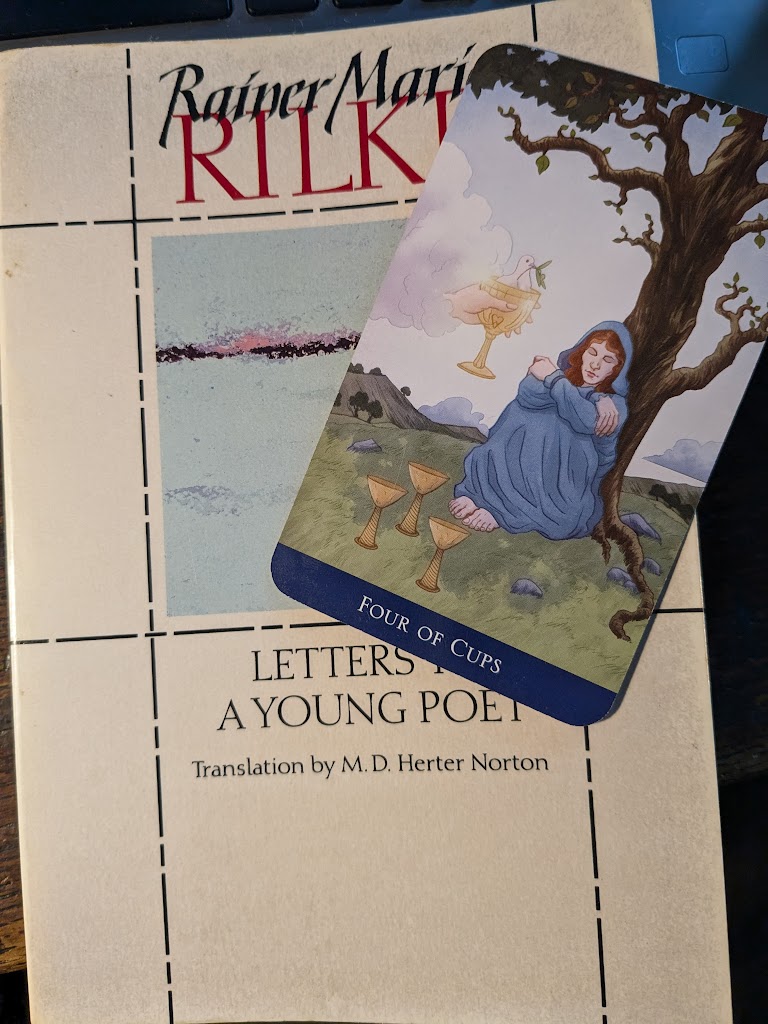Card for the day: 4 of cups
The Four of Cups reminds me of one of Rilke’s Letters To a Young Poet. The image is of a woman seated with her back against a tree, her arms crossed and feet tucked in, as if protecting herself, curled up into herself. Her eyes are closed, her hood covers her head. She’s closed to the world; she doesn’t want anything to come in nor let anything out. Even the gift being handed to her is too much for her right now.
In one of Rilke’s letter, he says, “I believe that almost all our sadnesses are moments of tension that we find paralyzing because we no longer hear our surprised feelings living. Because we are alone with the alien thing that has entered into our self; because everything intimate and accustomed is for an instant taken away; because we stand in the middle of a transition where we cannot remain standing” (Letter of August 12, 1904, p. 64). The woman depicted is at that point where she can no longer stand with the weight of her sadness, and she feels alone but also needs to be alone. The passage from Rilke says the reason for such responses to grief is “we no longer hear our surprised feelings.” We fail to attend to what’s really going inside ourselves; we don’t actually know what or who has entered us when it does. We are such permeable beings, physically, mentally, spiritually, and this woman shows what can happen when something enters our “house” and we don’t realize it.
The danger in the story of this card is of course remaining this way; this card can act as a warning against stagnation or failure to recognize any good in the world. But so much of Western culture insists on pushing through any grief, sorrow, depression, or trauma, without giving oneself space to experience those feelings in a full way. When we push away grief or sorrow it doesn’t go away, it only takes on a new appearance. We go on, but not fully integrated with ourselves. Rilke continues in the same letter: “sickness is the means by which an organism frees itself of foreign matter; so one must just help it to be sick, to have its whole sickness and break out with it, for that is its progress” (70). He goes on to tell Mr. Kappus, the person he’s writing to, that he’s not only the one sick but he’s also his own doctor who must watch over himself, but warns: “Do not observe yourself too much. Do not draw too hasty conclusions from what happens to you; let it simply happen to you” for otherwise we will risk judging ourselves (70-71).
Let our grief run its course. There’s a reason we need to withdraw. There’s a reason we feel like we need to cover ourselves, shut ourselves off, need solitude. Although I do like that the woman in the image is with a tree which reveals there is always some kind of relation going on—we are never really alone, especially when outside or around a nonhuman living being. And if we’ve attended carefully to ourselves, learned to actually listened to both our “surprised feelings” and our restorative ones, we will be ready to accept the gift of cup, dove, and olive branch.
Rilke, Rainer Maria. Letters To a Young Poet. Trans. M. D. Herter Norton. W.W. Norton & Co., reissued 1993.
(My Tarot deck is Llewellyn’s Classic Tarot by Barbara Moore and illustrated by Eugene Smith.)

